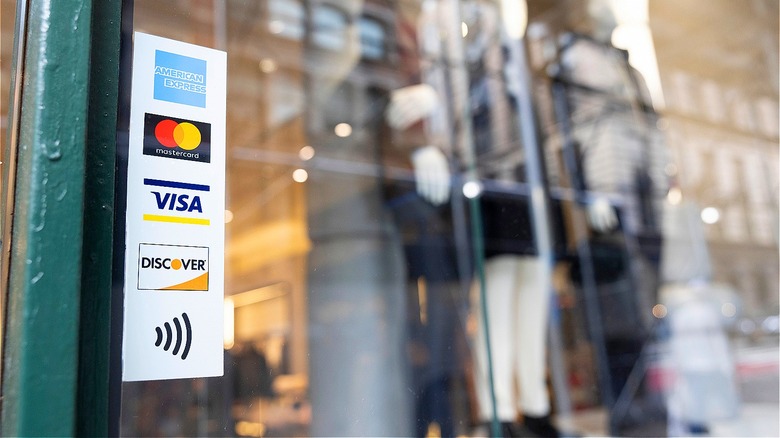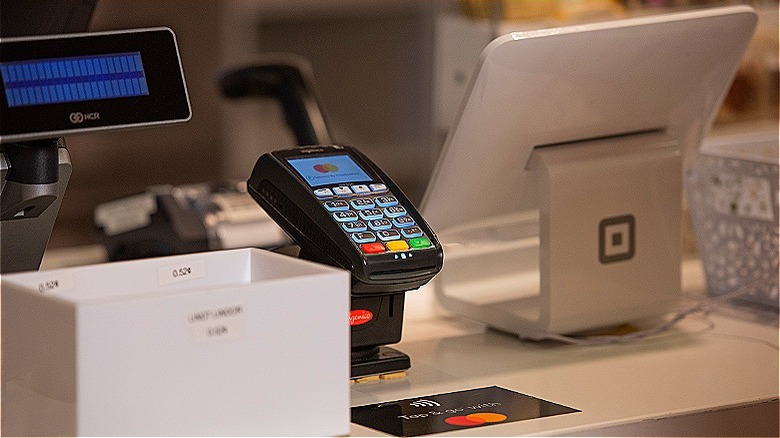Here's Why Some Businesses Charge You Extra For Using A Credit Card
If you feel like fees are popping up with increasing frequency these days, you're not alone. The Biden administration has even released new policies aimed at eliminating some of the junk fees plaguing Americans today. The White House estimates that junk fees cost the American people $65 billion a year. However, even with the Federal Trade Commission's proposed rules for eliminating junk fees, you might be surprised to learn that credit card fees by businesses could be sticking around.
For starters, credit card surcharges happen when a business charges a customer for using a credit card. It's important to know that it's not legal for a business to charge you a fee for using a debit card or for paying with cash. The current maximum surcharge a business can charge you for a credit card transaction is 4% of the total. These fees can add up fast and cost you a lot in the long term. Even worse, there's more than one way a business can choose to add surcharges and oftentimes businesses will be less than transparent about these fees until after it's too late.
While some states have legally prohibited these kinds of credit card fees, oftentimes businesses come up with new and creative ways to add other types of fees to purchases in order to ensure their profitability. So, even though critics claim that junk fee rules won't help bring down prices, there is something to be said for the increased transparency these policies might provide shoppers.
Why do businesses charge credit card fees?
Credit card issuers charge merchants a processing fee for each transaction they accept using their respective cards. These fees add up fast, can ultimately cut into a business's profits, and can even lead smaller businesses to choose not to accept credit cards at all. This is also why it's common to see stores refuse Discover and American Express since these two companies tend to charge higher processing fees. These processing costs can be especially difficult for businesses with low profit margins and, increasingly, are leading merchants to pass that cost on to customers. By adding a surcharge for credit card users at the time of their purchase, businesses are hoping to offset the profit loss on the transaction.
Merchants can't charge customers more than the cost of accepting the card or 4%, whichever ends up being lower (and if the processing fee a merchant ultimately has to pay exceeds that 4%, they're on the hook for the difference). The problem is, these added fees are often not displayed or communicated clearly to customers until after a purchase is made. Plus, these fees are ultimately not required and are entirely the choice of the business at the expense of customers. With that in mind, 10 states (California, Colorado, Connecticut, Florida, Kansas, Maine, Massachusetts, New York, Oklahoma, and Texas) have outright banned these kinds of fees so it's important to be wary of any businesses operating in these states that are still attempting to charge processing fees.
Credit card fees and things to look out for
Even if pass-through processing surcharges are being charged in one of the 40 states that legally allow them, there are still specific protocols that businesses must follow when charging them. Visa and Mastercard both require businesses that charge surcharges to register with the company. They also require merchants to be transparent about fees by displaying notices of their surcharge in-store and online, as well as by having the surcharge itemized and listed as an add-on fee on customer's receipts. Another way some businesses handle processing fees is by implementing minimum purchase amounts. For instance, when a grocery store requires a purchase of at least $10 in order to use a credit card. These are entirely up to individual merchants and how they decide to handle their credit card processing fees.
Another common credit card fee by businesses is known as a convenience fee, and this is generally charged when a customer chooses to purchase something in a less common way than the business typically accepts. For example, buying museum tickets online ahead of time instead of on-site. These fees are currently legal in all 50 states and can vary depending on your credit card issuer. For instance, Visa users can be subject to convenience fees on all nonstandard payment methods, whereas Mastercard and American Express users can only be charged by specific government agencies, educational institutions, and select utility companies. Discover allows convenience fees so long as the merchant is applying those same fees to other credit card issuers.


